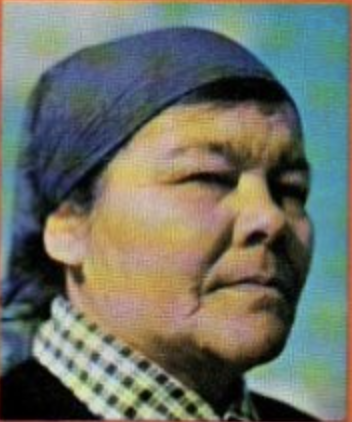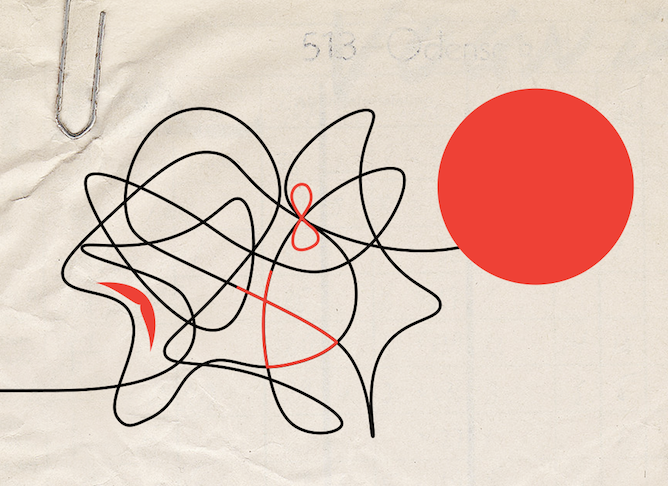
Image from cover of first edition of Je Suis une Maudite Sauvagesse, Lemêac, 1976
March 21, 1926 - November 13, 2004
An Antane Kapesh [1] is an Innu [2] writer and activist. Born on her traditional territory on March 21, 1926, Kapesh was raised in and practiced a traditional Innu life. She grew up speaking Innu-aimun, the language of the Innu people, with both her mother and father (a caribou hunter), who taught her to hunt, live, and thrive on her own territory. In 1942, she married taking her husband’s last name “Kapesh”. They had eight children and many grandchildren.
Kapesh and her husband were able to maintain their traditional lifestyle until 1953, when the Maliotenam reserve, near the town of Sept-îles, was established and they were moved into town. In 1956, the family moved again, along with many other Innu families, living in tents close to town in hopes to get work at the Iron Ore Company (IOC). Here, Kapesh and her husband purchased a small shack once her husband found work. In the same year, they were evicted by Iron Ore and the Kapesh family home, with the other families who had followed the same path, was moved three miles away to Lake John. For the next twenty years, Kapesh fought hard to prevent another forced move. As Chief of the Innu band in Schefferville from 1965 to 1967, Kapesh worked hard to have the government build houses for
them in Lake John, where the community was living, instead of back in town.
After great consideration, Antane Kapesh decided to begin writing down her life story and colonial experience in the 1970s. Her experience as an Innu woman was unique because she had gone from living off of her the land in her own culture, to being forced into the mainstream ways of life. She was forced to assimilate into a society that rejected her. She discusses these experiences in her first book, Eukuan nin matshimanitu innu-ishkueu (I am a Damn Savage) (1976). [3] In this book, she calls out the police, the liquor sellers, the game wardens, the residential schools, and the Quebec and Canadian governments, holding them accountable for the harm they have done to her community. She uses her own personal experiences as proof, writing about the language barrier between her and her own children after they were forced to attend a French school. She notes that her father was unable to hunt on his own territory for food because of development and biased hunting regulations. Kapesh writes using both pronouns, I and we, blending her individual and the greater Innu experience.
An Antane Kapesh published her second book Tanite nene etutamin nitassi? (What did you do with my country?) in 1979. It tells the story of colonization of Turtle Island through the metaphor of a child and the “Polichinelles,” representing Indigenous peoples and settlers respectively. This second book highlights how colonizers betrayed and attempted to ruin the people who first helped them (Boudreau). Like her first book, this was written in Innu-aimun and translated into French, in a facing page edition. This story was adapted for the stage in 1981 by Kapesh and José Maillot (who translated her first book into French).
In both her books and in her life, her intention was for Innu children to learn about their culture and about their language: "I want to write to write to defend my culture, so that the Montagnais [Innu] of the future will know that their people have lived otherwise than in a reserve.” She attempted to share a new story with a wider audience, to make her people, her language, and her experiences as an Innu woman known. She passed away in 2004.
Please note that since 2020, when TPatT colleague Dr. Sarah Henzi, translated Kapesh’s text into English, there has been a significant increase in scholarly attention on Kapesh’s work.
Works Cited:
Antane Kapesh, An. Je Suis Une Maudite Sauvagesse: Eukuan Nin Matshimanitu Innu-Iskueu. French Translation, José Mailhot, In collaboration with Anne-Marie André and André Mailhot.1976.
---. I Am a Damn Savage; What Have You Done to My Country?/Eukuan nin matshi-manitu innushkueu; Tanite nene etutamin nitassi?. Translated by Sarah Henzi, Wilfrid Laurier UP, 2020.
---. Qu’as-tu fait de mon pays?: Tanite nene etutamin nitassi? Éditions Impossibles, 1979.
Boudreau, Diane. “17 An Antane Kapesh, écrivaine (1926-2004)” Press Books. https://femmessavantes2.pressbooks.com/chapter/an-antane-kapesh-1926-2004/. Retrieved 12 May 2018.
---. “An Antane Kapesh, la mémoire montagnaise”, Châtelaine, April 1988, pp. 200-202.
Dominguez, Luis. Cultural Resistance and Native Testimonio in the Americas: A Study of
the Life Stories by Juan Pérez Jolote, Nuligak Kriogak and An Antane Kapesh, University of Sherbrooke (Canada), 2012. ProQuest.
Mailhot, Amélie-Anne, et al. “La Perspective De l’Habitation Politique Dans Je Suis Une Maudite Sauvagesse/Eukuan Nin Matshimanitu Innu-Iskueu d’An Antane Kapesh.” Recherches féMinistes, vol. 30, no.1, 2017, pp. 29–45.
Additional Resources:
For a summary/review of An Antane Kapesh’s Je Suis une Maudite Sauvagesse, using it as a model that explores “how testimony is used as a contested space for cultural survival, more precisely how Kapesh uses the written word to provide an alternate history of Indigenous identity” (Rimstead 189), see:
Rimstead, Roxanne, and Domenic A. Beneventi. “Reclaiming Indigenous Space through Testimonial Life Writing: An Antane Kapesh’s Je Suis Une Maudite Sauvagesse as Territorial Imperative.” Contested Spaces, Counter-Narratives, and Culture from below in Canada and Québec, U of Toronto P, 2019.
For an article that uses Kapesh and Mini Aodla Freeman to consider perspectives of Indigenous women’s writing that sheds light on post-colonial relationships, see:
Couture-Grondin, Élise. “Life writing, positions, and embodied criticism: Relating to An Antane Kapesh’s and Mini Aodla Freeman’s first-person narratives.” Studies in American Indian Literatures, vol. 32, no. 3–4, 2020, pp.107–128. https://doi.org/10.1353/ail.2020.0020.
Excerpt:
I do not remember when I first heard of An Antane Kapesh's Eukuan nin matshi-
manitu innushkueu/Je suis une maudite Sauvagesse (I Am a Damn Savage). The
original 1976 edition, which I found in the library at the University of Toronto,
with its hard navy blue cover, was exactly the type of text I was looking for: a
version of Québec's colonial history from the perspective of an Indigenous
woman who had lived it. A few months later, one of my professors suggested
that I read Mini Aodla Freeman's memoir, My Life Among the
Qallunaat (1978). Kapesh and Aodla Freeman both describe drastic changes that
occurred in the second half of the twentieth century—not so long ago—when
the province of Québec suddenly showed a strong interest in its northern
territories. Notably, the authors address the relationship between the Innu and
the white people, the Inuit and the qallunaat, respectively. Both accounts
express weariness, largely due to the impossibility of practicing traditional
ways in a time of forced deculturation while, at the same time, affirming Innu
and Inuit knowledge production and transmission.
For an article about colonial violence in Quebec see:
Henzi, Sarah “And Whom We Have Become”: Indigenous Women’s Narratives of Redress in Quebec.” Studies in Canadian Literature / Études en littérature canadienne, vol. 46, no. 2, 2021, pp.186–212. https://doi.org/10.7202/1091108ar
Abstract:
Kapesh used as a resource for retelling first-hand experience of violence against Indigenous peoples in Quebec from the state/police. Kapesh’s being silenced through her book being out of print for decades is also expanded upon.
For an article on writing in a colonial language see:
Henzi, Sarah. “Indigenous languages matter.” Translation Studies, vol.17, no.1, 7 Dec. 2023, pp.185-189. https://doi.org/10.1080/14781700.2023.2271467
Abstract:
Over several decades, Indigenous writers have spoken about grasping, taking control, and (re)mastering the colonial language in which they (have had to) write and publish; Maria Campbell, Lee Maracle, An Antane Kapesh, Mini Aodla Freeman, Gerald Vizenor, Louis Owens, Simon Ortiz, N. Scott Momaday, to name only a few, were amongst the first voices to say as much, whilst also delivering teachings for other burgeoning writers that learning to “manipulate” the colonial language could lead to “personal liberation”(Campbell,1992, 10).
For an article that compares Kapesh with other writers from minority cultures, see:
Merkle, Denise. “Indigenous linguistic and cultural revitalization in Canada: Toward the demarginalization of indigenous narrative voices and ‘texts.’” Comparative Literature Studies, vol. 59, no. 4, Nov 2022, pp. 664–681,
https://doi.org/10.5325/complitstudies.59.4.0664
Abstract
This article will briefly present the work of five intercultural mediators who have contributed actively to sharing knowledge between dominant and Indigenous groups in Canada—Robert Dickson (interlinguistic settler translator); Tomson Highway (Cree writer, (self- )translator, and dramatist); An Antane Kapesh (Innu writer); José Mailhot (interlinguistic settler translator); and Kent Monkman (Cree painter and (intra-)semiotic (self-)translator). While Highway and Dickson produce “minor” narrative texts, “minor” will also be applied to the field of the visual arts to discuss Kent Monkman’s use of Cree in certain works and his rewriting of canonical works of art. The article will examine the extent to which these five mediators are “(un)known” and their works have entered a transnational space. Furthermore, the article will analyze the relations of these mediators with their respective Indigenous, and English or French language(s) and culture(s). The case studies are aimed at adding to the literature on the narrative activities of members of minority cultures, which have managed to penetrate a global translation zone. The political dimension of intercultural mediation will also be briefly assessed. Finally, the interlinguistic translators of Kapesh’s essays and Highway’s novel will be considered as mediators for dominant culture recognition.
For a recent public reading of Kapesh’s work see:
Fricker, Karen and Melissa Poll. “Joining a Festival During a Pandemic: Martine Dennewald and Jessie Mill Discuss the Tiohtiá:ke/Montréal-based Festival TransAmériques (FTA), Contemporary Theatre Review, vol. 3, no. 3-4, 2022, pp. 330-335 https://doi.org/10.1080/10486801.2022.2119963
Abstract:
Staged reading of Kapesh’s book by Innu artist Natasha Kanapé Fontaine at TransAmériques Festival in Montreal described as “historical moment”.
For a discussion of Kapesh and her book as a significant resource for the displacing of Innu by white settlers see:
Cassell, Elizabeth. “The Terms of Our Surrender: Colonialism, Dispossession and the Resistance of the Innu” Institute of Commonwealth Studies, 2021. 10.14296/202110.9781912250486
Abstract:
Based on extensive fieldwork and oral history, “The Terms of Our Surrender” is a powerful critical appraisal of unceded indigenous land ownership in eastern Canada. Set against an ethnographic, historical and legal framework, the book traces the myriad ways the Canadian state has successfully evaded the 1763 Royal Proclamation that guaranteed First Nations people a right to their land and way of life. Focusing on the Innu of Quebec and Labrador, whose land has been taken for resource extraction and development, the book strips back the fiduciary duty to its origins, challenging the inroads which have been made on the nature and extent of indigenous land tenure—arguing for preservation of land ownership and positioning First Nations people as natural land defenders amidst a devastating climate crisis. It offers a voice to the Innu people, detailing the spirituality practices, culture and values that make it impossible for them to willingly cede their land.
The text is intended to bridge the gap in knowledge between legal practitioners and those working at the intersections of human rights, social work and public policy. The book offers a potent template for how we can use the law to fight back against the indignities suffered by all indigenous peoples.
For an example of recent scholarship at the doctoral level see:
Janssen, Jessica. “Contemporary Indigenous Women Writers in Quebec: Re/Connecting with the Self, Community, and Land through Resurgent Storytelling.” Contemporary Indigenous Women Writers in Quebec: Re/Connecting with the Self, Community, and Land through Resurgent Storytelling, Thesis / Dissertation ETD, Université de Sherbrooke, 2023.
https://savoirs.usherbrooke.ca/bitstream/handle/11143/20690/janssen_jessica_PhD_2023.pdf?sequence=7
Abstract:
In Quebec, Innu writer An Antane Kapesh is one of the first Indigenous women who, in Eukuan nin matshi-manitu innushkueu / Je suis une maudite Sauvagesse, creates an important link between personal life experiences and collective experiences of “the larger structures and process of settler colonialism”.
Endnotes:
[1] Her Christian name, given to her when she was baptized in the 1950s, is Anne André. French publications and versions of her book use this name instead of her Innu name.
[2] The Innu people are people from what is traditionally known as Innu-assia, today known as North East Quebec and Labrador. The people and language have also been referred to as Montagnais but the term Innu is more generally and officially used today.
[3] The book was translated into French in 1982 and the publication of an English version is currently in the works.
An Antane Kapesh entry by Alison Wick, September 2018. Updated April 2019. Ali is an alumnus of Simon Fraser University, with an undergraduate degree in Indigenous Studies.
Additional Resources collected by Eli Davidovici in April 2024. Eli is an alumnus of McGill University, graduating with an M.Mus. in Jazz Performance in Summer 2024.
Entry edits by Margery Fee, April 2024. Margery Fee is Professor Emerita at UBC in the Department of English.
Please contact Deanna Reder at dhr@sfu.ca with any comments or corrections.

